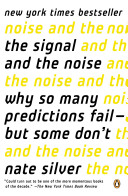The Problem with Occam's Razor
In climate forecasting, the situation is more equivocal: the theory about the greenhouse effect is strong, which supports more complicated models. However, temperature data is very noisy, which argues against them. Which consideration wins out? We can address this question empirically, by evaluating the success and failure of different predictive approaches in climate science. What matters most, as always, is how well the predictions do in the real world.
I would urge caution against reducing the forecasting process to a series of bumper-sticker slogans. Heuristics like Occam’s razor (“other things being equal, a simpler explanation is better than a more complex one”50) sound sexy, but they are hard to apply. We have seen cases, as in the SIR models used to forecast disease outbreaks, where the assumptions of a model are simple and elegant—but where they are much too naïve to provide for very skillful forecasts. We have also seen cases, as in earthquake prediction, where unbelievably convoluted forecasting schemes that look great in the software package fail miserably in practice.
An admonition like “The more complex you make the model the worse the forecast gets” is equivalent to saying “Never add too much salt to the recipe.” How much complexity—how much salt—did you begin with? If you want to get good at forecasting, you’ll need to immerse yourself in the craft and trust your own taste buds.
Knowing the limitations of forecasting is half the battle, and on that score the climate forecasters do reasonably well. Climate scientists are keenly aware of uncertainty: variations on the term uncertain or uncertainty were used 159 times in just one of the three IPCC 1990 reports.51 And there is a whole nomenclature that the IPCC authors have developed to convey how much agreement or certainty there is about a finding. For instance, the phrase “likely” taken alone is meant to imply at least a 66 percent chance of a prediction occurring when it appears in an IPCC report, while the phrase “virtually certain” implies 99 percent confidence or more.
Notes:
Not all models can be simple.
Folksonomies: simplicity certainty modeling
Keywords:
unbelievably convoluted forecasting (0.992565 (negative:-0.646133)), different predictive approaches (0.901500 (negative:-0.207240)), climate forecasting (0.828413 (negative:-0.437322)), forecasting process (0.752910 (negative:-0.773153)), IPCC authors (0.744667 (neutral:0.000000)), IPCC report (0.737403 (negative:-0.378329)), climate science (0.705842 (negative:-0.207240)), complicated models (0.698117 (positive:0.236740)), greenhouse effect (0.695663 (neutral:0.000000)), climate forecasters (0.690272 (positive:0.280950)), temperature data (0.684009 (negative:-0.240937)), bumper-sticker slogans (0.680851 (negative:-0.773153)), real world (0.679754 (positive:0.602698)), simpler explanation (0.674879 (positive:0.504143)), skillful forecasts (0.671842 (positive:0.315927)), disease outbreaks (0.668370 (negative:-0.401740)), percent confidence (0.664568 (positive:0.276501)), percent chance (0.664002 (negative:-0.378329)), earthquake prediction (0.659596 (negative:-0.389069)), taste buds (0.659364 (positive:0.626370)), software package (0.655091 (negative:-0.646133)), SIR models (0.647419 (negative:-0.401740)), Occam (0.555773 (negative:-0.334924)), razor (0.541729 (negative:-0.334924)), uncertainty (0.506028 (positive:0.516160)), phrase (0.499235 (neutral:0.000000)), cases (0.491818 (negative:-0.308624)), admonition (0.473768 (neutral:0.000000)), Heuristics (0.462020 (neutral:0.000000)), caution (0.459714 (negative:-0.773153))
Entities:
IPCC:Organization (0.977771 (negative:-0.378329)), Occam:Company (0.958619 (negative:-0.334924))
Concepts:
Forecasting (0.987804): dbpedia | freebase | opencyc
Prediction (0.853165): dbpedia | freebase
Futurology (0.660357): dbpedia
Scientific method (0.642954): dbpedia | freebase
Future (0.636026): dbpedia | freebase
Uncertainty (0.523870): dbpedia | freebase | opencyc
Reference class forecasting (0.507872): dbpedia | freebase
Occam's razor (0.459320): dbpedia | freebase | yago






